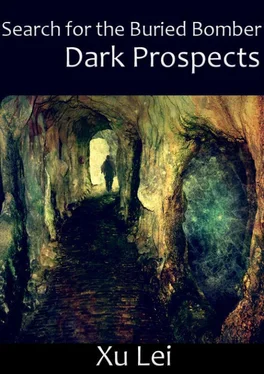After we’d reached a certain point, Wang Sichuan suggested we walk along one of the concrete ridges that ran through the pools. It appeared to continue far into the depths of the mist. Though it was so narrow that maintaining one’s balance would be difficult, it was better than just walking across the ice. I agreed. Swaying as if we were on a tightrope, we made our way into the mist. As we left the regular iron-grate walkway I felt a twinge of timidity. It had been like a lifeline to us. The trek on the cement ridge was endless. Perhaps it was the severe cold or perhaps we were overcautious, but either way our progress was slow. Shaking from the cold and surrounded by a dense mist, neither of us had anything to say. By the end of it, I felt as if I were in a trance.
At last Wang Sichuan stopped. He called out from behind me. A line of large shadows, each about half as tall as a man, had appeared up ahead. Increasing our pace, a moment later we reached the edge of the open space. The shadows were a row of cryptic machines arrayed along the wall, their exteriors covered in icy frost. From them emerged a riot of pipes that snaked over to the concrete pools and plunged into the ice. Numerous placards were hung just overhead. Wang Sichuan knocked the frost off a few. They were serial numbers, with something like “Cold-03-A” written on each, all of them arranged in a specific order. The serial numbers on the pipes were much more complex, seeming to indicate that they were responsible for keeping the pools cold. These, I guessed, were the refrigeration compressors. The temperature dropped severely as we walked alongside them. My teeth began to chatter.
We soon came upon a huge doorway—approximately fifteen feet wide—cut into the concrete wall. The door itself was covered in frost and outfitted with a torque-operated door bar. Partially open, its iron body was astonishingly thick. Wang Sichuan kicked it several times, but it remained absolutely still. Something about it felt very familiar, as if I’d seen it before, though I couldn’t recall where. It wasn’t until Wang Sichuan snapped off several chunks of ice, revealing the characters written underneath, that I finally remembered. Written on the door, in very large script, was “Plan 53.” It was nearly identical to the huge iron door we’d dug up from beneath the rock on the first part of the underground river. Could the space behind this door also be filled with explosive charges? It didn’t seem too likely. The door was cracked open just wide enough to admit a single person. The hinges were frozen solid and the thing wouldn’t budge.
I took a deep breath. Then Wang Sichuan and I filed in one after the other. The temperature inside was slightly warmer, and consequently the mist was especially thick, but after we took a few steps it began to disperse. We stared wide-eyed. Behind the door was an ironwork tunnel, very tall and as wide as the doorway. It seemed to be a passageway for transporting large-scale equipment. We walked farther in. The smell of rusted iron became stronger and stronger, the ground beneath our feet increasingly rough and uneven. Ahead of us was only darkness. I was hesitating about whether to continue on when Wang Sichuan tapped me on the shoulder. He pointed at the wall. It was covered in scales of bubbling rust. A long section had been rubbed off by someone’s hand, and where the rust had spread to the floor, we distinctly saw footprints. Two pairs of them.
These marks had been made only recently. My spirits rose at once. It seemed we had located Yuan Xile’s trail. Following the markings, we quickened our pace. Soon we were running down the pitch-black passageway, shining our flashlights all around us. In the time it takes to smoke half a cigarette we were out, only to find ourselves atop a high platform. The area below was vast and open, the ceiling tall and hung with steel crossbeams. As we shined our flashlights down, an astonishing scene appeared before us. Down below was a gigantic factory. Two huge iron rails ran along its floor like a pair of giant scars. A set of iron stairs led down from the platform. A few moments later, we were on the factory floor. From this vantage, the room looked even more vast. Various machines were strewn all about. Old, dust-covered tarpaulins covered pile after pile of things unseen. A hook used for heavy lifting hung from overhead, its twenty years of disuse not immediately obvious. At the very least, the room didn’t smell of rusted iron. A ventilation unit identical to that of the caisson ran along the baseboard. It must have remained in operation these past twenty years, for the air here was relatively clean and dry. We switched on our flashlights, though we didn’t know what we were searching for. Few of the structures the Japanese left behind in the Northeast had been kept in such perfect condition. The vast majority had been destroyed prior to their departure. Had the Japanese really left in such a hurry?
I soon found myself standing before a long partition. At first glance, the mass of papers pasted across it looked similar to the posters proclaiming new production records during the Great Leap Forward. Looking closer, I discovered they were actually schedules, all of them written in Japanese, along with a series of structural blueprints I didn’t understand. The blueprints were stained with mildew and had already turned soft and yellow. The moment I touched one, a whole stretch of them dropped to the floor. I dared not touch anything else. Shining my flashlight before me, I watched as war propaganda posters and black-and-white photos appeared now and again in the circular beam.
“This has to be where the Japs assembled the Shinzan,” I said to Wang Sichuan. It had been broken down into its smallest components prior to being transported here. The job of reassembling it probably continued over the course of several months. Here the components would have been maintained and repaired if necessary, oiled, and then reassembled into larger parts.
“In that case,” said Wang Sichuan, “moving this stuff out of here would definitely require some kind of gigantic freight elevator. We’d better look around for it. Maybe that’s the way out.”
We scanned our surroundings as we walked. Something on the wall caught my attention. Hanging there was a wooden board with black-and-white photos of all sizes pasted over every inch. Some were group shots, some just of one person. All of those photographed were wearing the kind of Japanese military uniforms you see on TV, disgraceful smiles on their faces. These had probably been shot during some holiday here. There was one photo that particularly drew my interest: Several Chinese workers, so thin their bones looked like firewood, were dragging some object out of the water. It was still half submerged and utterly black, like a mass of jellyfish. A Japanese soldier stood watching them. I couldn’t tell what the thing was. The photo was too blurry. I was about to call Wang Sichuan over when I realized he was already yelling my name. He’d walked some distance away and was standing by one of the tarps. I hurried over just as he yanked the cover half off. There, beneath the tarp, was a deathly pale human hand.
Wang Sichuan pulled the tarp all the way off. Amid the cinder blocks and steel bars was a corpse, dressed in the uniform of the engineering corps. The body was squeezed into a pile of steel bars. We pulled it out. It was hard as a rock, probably due to the cold. This person had been dead for some time. We turned him over. The face was unfamiliar to us, its expression panic-stricken. His eyes were opened so wide they bulged in their sockets. He was a young man, but I couldn’t tell whether he’d been among the four groups who entered with us. Considering how long he’d been dead, he’d probably been part of Yuan Xile’s team. Counting him, we’d now come across three of its members: two were dead and one was crazy. Where was everyone else?
Читать дальше












